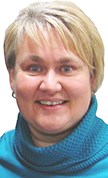A familiar adage cautions us to never meet our heroes lest we discover they have feet of clay. The danger is that we find out just how ordinary and fallible they might be. In not living up to our perceptions of them, we could end up disappointed or deflated. They're not who we thought they were--or perhaps they're not who we built them up to be.
ÌýÌýÌýÌýÌýÌýÌýÌýÌýÌýÌý In any number of settings from educational to social, we are asked to think about the people we would most like to meet if given the opportunity. One of the most common is: which historical figure would you most like to have dinner with? Our answers might change over time as our interests and experiences change. My list has included a king, a philosopher, a writer, and a 18th century composer, yet even as I recall these, several others come to mind that I would add today.
ÌýÌýÌýÌýÌýÌýÌýÌýÌýÌýÌý Narrowing the question might be fun. Which celebrity would you most like to spend a day with in New York City?Ìý Which of your ancestors would you choose if you could ask three questions of them? Who would top the list of world leaders you would like to share a conversation with? Yet as interesting as any of these ventures might be, there would be part of me that would be reticent, too. Not so much feeling leery of meeting a hero, but of questioning my own definition of the label.
ÌýÌýÌýÌýÌýÌýÌýÌýÌýÌýÌý What if the people I should really want to meet are ones I know little about. It's not so much a caution against meeting our heroes, but instead examining who our heroes are.
ÌýÌýÌýÌýÌýÌýÌýÌýÌýÌýÌý There are business people, venture capitalists, innovators, and celebrities who are generous in their resources toward fighting poverty, isolation and homelessness. We can be grateful for their philanthropic efforts. But last winter I met a man who was a powerful example of what giving can look like without that kind of money. Tony grew up in miserable conditions in a country where his ethnicity led to discrimination and abuse. Nothing about his life was easy, nor was education attainable. But Tony came through all of that with the most amazing heart and compassion for others. He and his wife live simply so that they can help as many others as they can. They are making a huge difference in their community in Eastern Europe and changing lives each and every day. They don't have access to the resources others have, but what they are accomplishing out of their lack, is remarkable.
ÌýÌýÌýÌýÌýÌýÌýÌýÌýÌýÌý Robbie, an eight-year-old boy in Florida, entered a loving adoptive home after spending difficult years dealing with abuse that led to two hospitalizations. Unable to express emotion in a manner familiar to most of us, it was after the death of the family dog in his new home that he was finally able to cry. He loves visiting animal shelters and is said to seek out the "oldest, mangiest, least adoptable mutt of the lot", and is determined to care for as many as his family with allow. His other dream is to one day become a foster parent. Drawing on his experience of feeling that people "only want babies and puppies" he is determined to love those that sometimes go unseen.
ÌýÌýÌýÌýÌýÌýÌýÌýÌýÌýÌý The greatest gestures may not be the biggest, nor the biggest heroes amongst those who are considered the greatest. But they are likely the people we would be best served to meet. Or, perhaps more precisely, to recognize we may have already met them. The problem is they may have gone unnoticed because they are the first to shrug off the label. They believe they are simply doing what any of us should: look after one another.
ÌýÌýÌýÌýÌýÌýÌýÌýÌýÌýÌý Redefining who our heroes are will open the floodgates, and our eyes, to the many all around us. The great thing is there's little risk in meeting them because we already know who they are. Let's just make sure we seize opportunities to invite them for dinner, ask some questions and share a conversation. Yes, they have feet of clay. It's what ensures they keep their feet on solid ground. That's my outlook.
Ìý
Ìý




